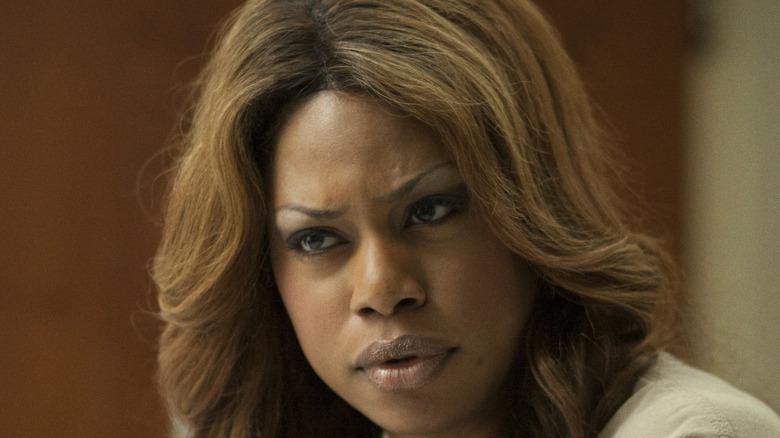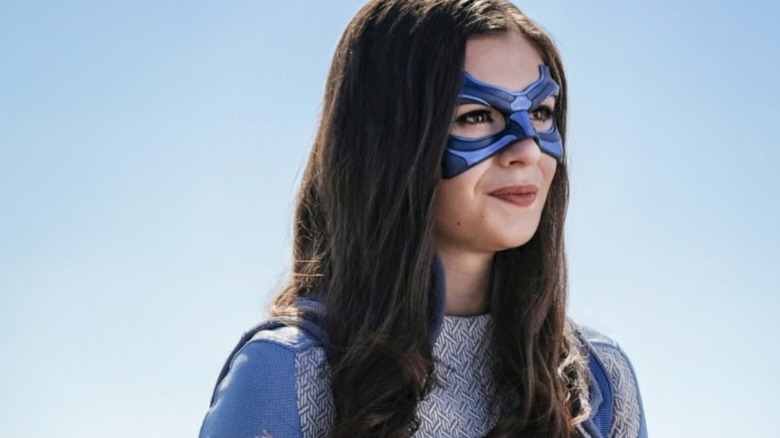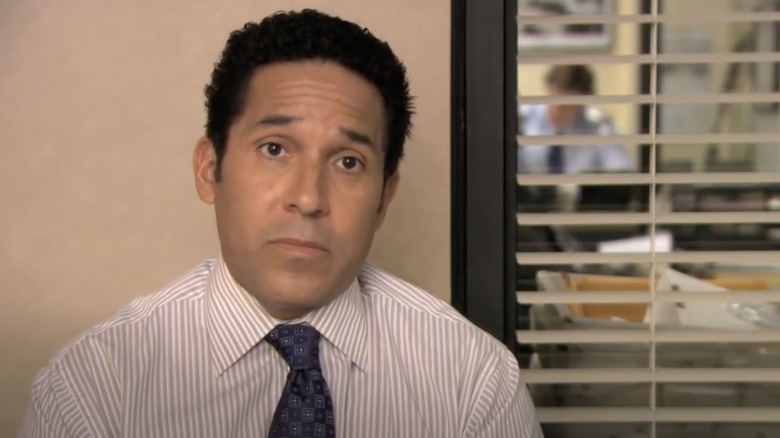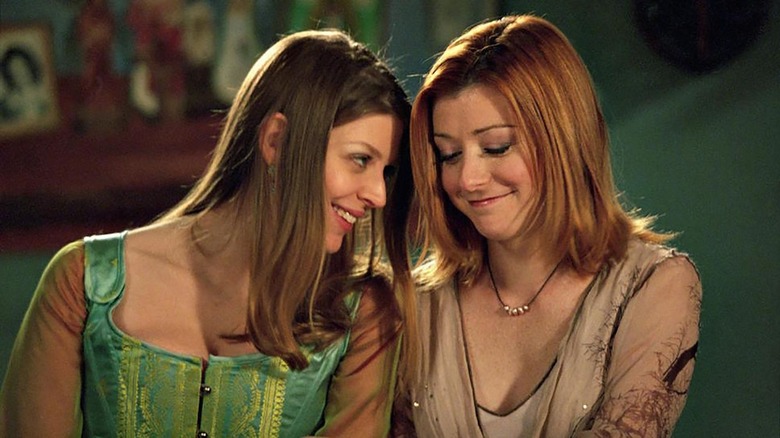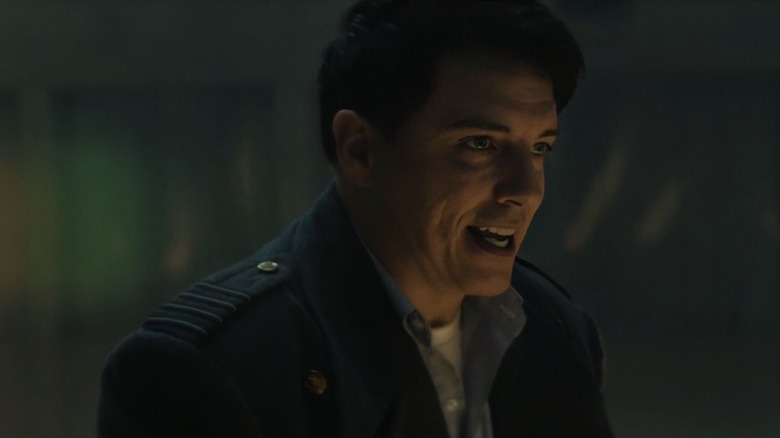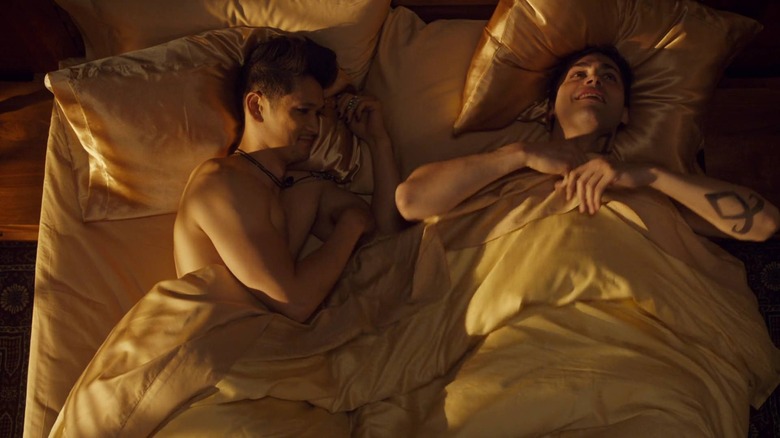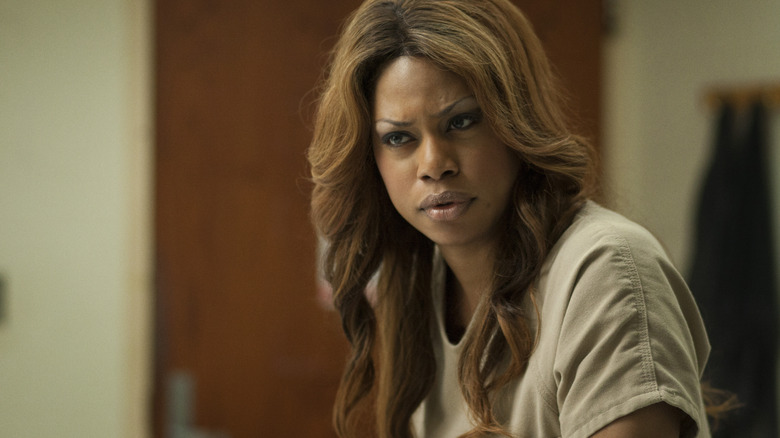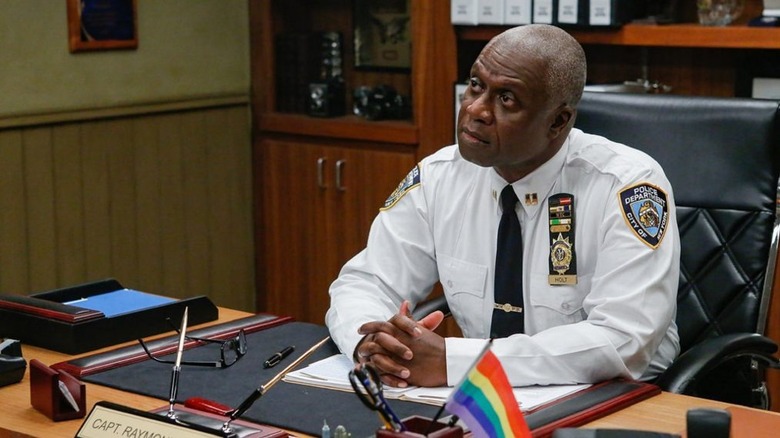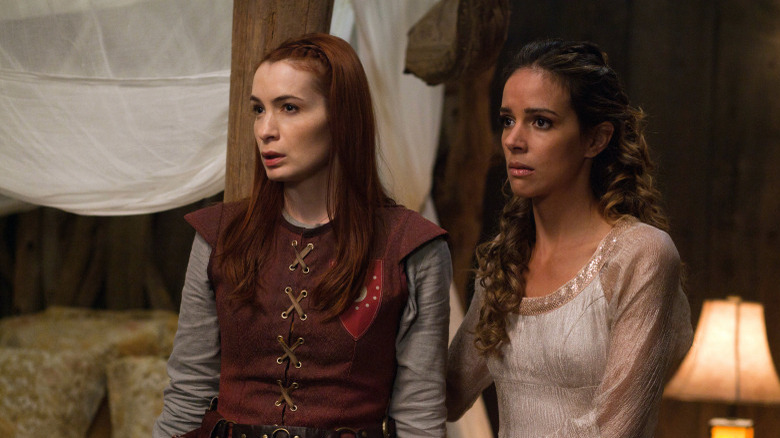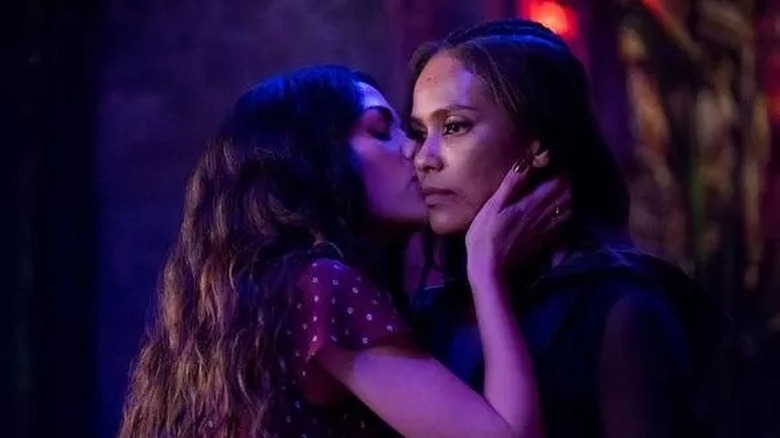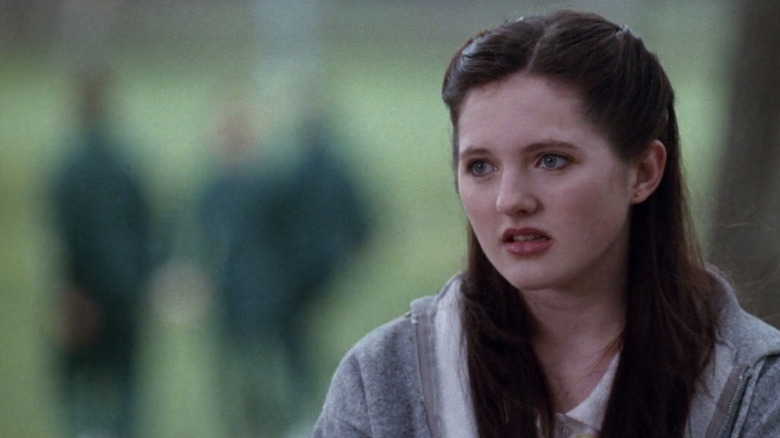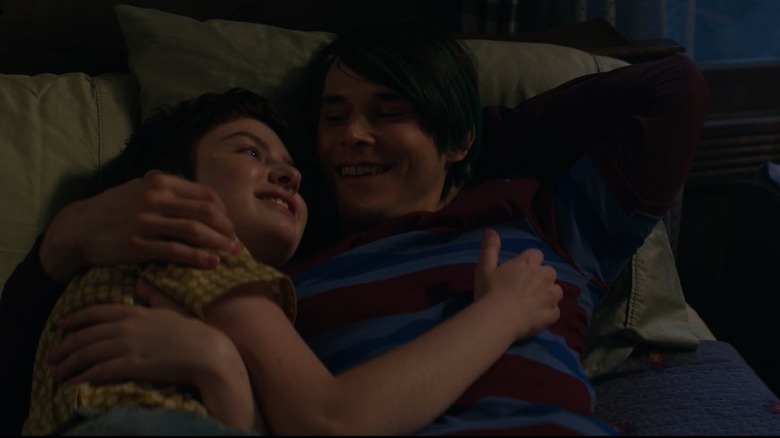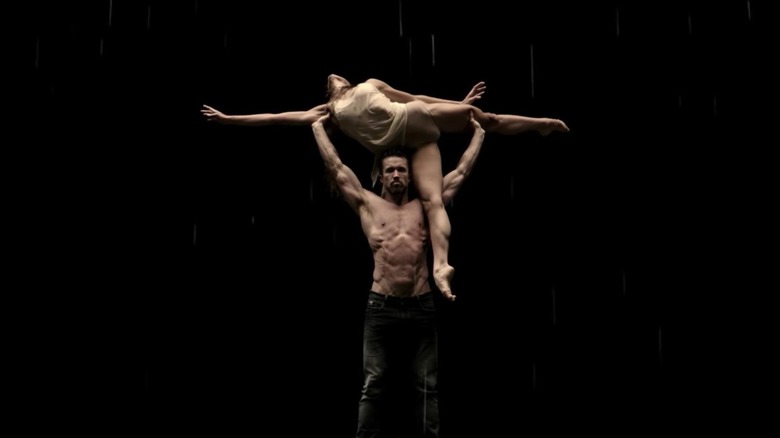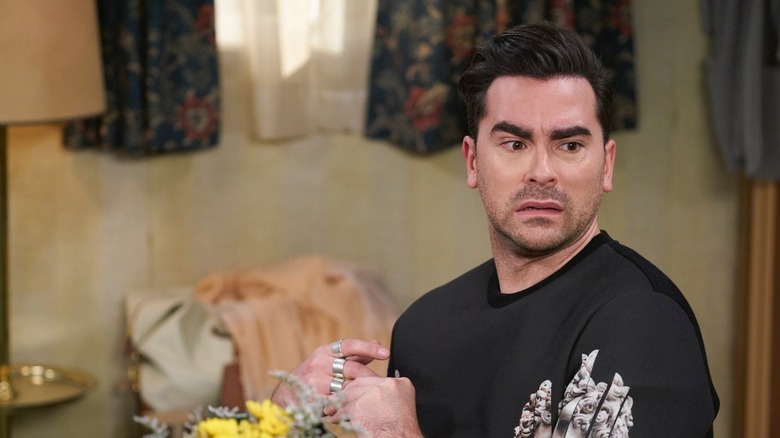The Best LGBTQ Characters In TV History
TV has come a long, long way since LGBTQ+ characters first made their way onto TV screens. While queer characters have been around for decades on both the TV and silver screen, the oldest renditions tended to be highly problematic, one-dimensional, and rely on damaging stereotypes — usually for inappropriate comedic value. But as society continued and continues to evolve, so has the representation we see in fictional content.
When we talk about the best queer characters in TV history, newer characters blow many earlier characters out of the water with the incredible headway that Hollywood has made in the past few years, let alone decades. In addition to toxic portrayals, numerous older characters also fall into the "bury your gays" trope — where they often die to further the plot of the straight main character or for tragedy porn for the token queer couple.
With the new (and improved) positive spin on queer relationships, hiring actual members of the trans community to play trans characters, showing positive relationships that aren't just doom and gloom, we're seeing queer characters live we've never seen them before. Many of the earliest LGBTQ+ characters made history as "firsts," but being first doesn't mean being best. Of course, the movement owes everything to the headway some of those early queer characters made, but first does not always equal best. With that in mind, these are the best LGBTQ+ characters in TV history.
Dreamer saw a better future in "Supergirl"
It's always incredible when a "first" is also a "best." Back in 2018, trans actress Nicole Maines made TV history as the first trans superhero as Nia Nal/Dreamer on "Supergirl." It's wild that it took that long to give TV a trans superhero, but the arc was worth the wait. Arrowverse fans got to watch as Nia discovered her superpowers — which only manifest in one woman in her family per generation. As Nia has a cis sister, this storyline is absolutely beautiful, and a wonderful message that who you are has nothing to do with what someone determines about you at birth. That visceral validation rarely shines through in such an irrefutable way, and it was an incredible arc.
To all of the trans kids and adults, who never saw themselves in TV superheroes, Dreamer became the hero everyone needed. She has a well-developed relationship with Brainiac, an incredible superhero arc, and she is a badass guardian for the trans community even in the show.
The episode "Reality Bytes" is one of the most progressive and impactful TV episodes to date. Tackling transphobia, the heartbreaking and staggering murder rate against the trans community (specifically trans women of color), and how unsafe it can be for trans individuals to date, the episode is doused in realism. Maines wrote some of the best lines in this episode herself. The writers even consulted her every step of the way, making an incredibly powerful and educational episode of TV based on the real trans experience.
Oscar Martinez was ready to call out his "Office" coworkers
We need more queer characters who call people out on their homophobic nonsense, and Oscar Martinez was always ready to bring that juice on "The Office." For instance, when Andy was having a sexual identity crisis, Oscar said: "What exactly is my responsibility here? To comfort an insecure heterosexual man? That can't possibly fall to me." That's a real damn mood, Oscar.
Time and time again, Oscar's coworkers singled him out, asked him invasive sexual questions, and even sexually assaulted him in an attempt to be "supportive." While it was hilarious to watch Oscar verbally smack down his clueless coworkers, his role on the series was more important than people might remember. He offered an invaluable "what not to do" guide for people outside of the LGBTQ+ community, and even if people didn't necessarily realize it, they were learning what stupid questions not to ask the LGBTQ+ people in their life.
Oscar certainly wasn't a perfect person (he hooked up with Angela's husband after all), but that made his character arc all the more realistic. TV tends to either paint queer characters and relationships in perpetual deadly angst, make their entire story about coming out, or idealize their entire existence. Oscar Martinez was just an accountant at a dying paper company — who happened to be gay.
Witchy women seeking women in "Buffy"
When Willow Rosenberg had her coming out arc in 2000, queer representation, especially for lesbians, was almost nonexistent — particularly in genre shows. Willow and Tara Maclay had one of the best relationships on "Buffy the Vampire Slayer." Not only was their development organic, but it was believable in a way that some of the other show's relationships were not. Willow's past love for Xander and Oz affirmed that sexuality is fluid. Though Joss Whedon noted to Metro.Uk that he was pressured against making Willow bisexual, her arc was still crucial for the development of genre TV representation.
Willow and Tara's story fell into "doom and gloom" territory with killing off a queer character for drama — but when almost every straight relationship also faced a dramatic (and) or deadly end, it didn't seem personal. Things really went south for Willow and Tara when Willow's descent into dark magic manifested itself as a toxic metaphor for addiction. Yet, just when Tara and Willow finally worked things out, Warren brutally murdered Tara, sending Willow on a vengeance quest.
Willow and Tara aren't the only great queer characters in the "Buffy" universe, however. We stan a green demon who hits on anything that moves — and it's even better when he can tell your fortune through karaoke. If that's not the American Dream, what is? Lorne is a slightly ridiculous character in the "Buffy" spinoff "Angel," but he makes every single scene better with his presence. He will hit on any man, woman, demon, or otherwise who meets his bright red eyes, but he's more than sass and innuendo.
Captain Jack Harkness didn't need your labels
Sometimes, audiences just want a flirty queer character whose sexuality is just never a big deal. There isn't a major coming-out arc, there's not a slew of homophobic angst to deal with at every turn, and the character is free to be unequivocally themselves without question. First appearing in the 2005 "Doctor Who" episode "The Empty Child," Captain Jack Harkness offered that to fans long before it was commonplace. Jack never put himself into a box — flirting with anyone (or anything) that moved.
To boot, it's always refreshing when LGBTQ+ actors play queer characters, and John Barrowman provided some "own voice" representation to the screen before it was even close to being the norm. In fact, bisexual characters were a rarity in and of themselves at the time, and it was nice to see a queer character have a fun and flirty bisexual arc without it being super dramatic. In the "Doctor Who" spinoff "Torchwood" we even saw Jack in a relationship with another bisexual man named Ianto. Some might accuse the show of falling into the "bury your gays" trope when Ianto faced a tragic death in Jack's arms, but then again, nearly every single character on this show also died, so it's not singling the queer characters out.
The Shadowhunter and the Warlock
It's incredibly rare for genre TV to give us a gay pairing with a happy ending. But Magnus Bane and Alec Lightwood not only survived the duration of "Shadowhunters," but their relationship survived, too — even with their star-crossed lover elements. The show also fixed the books' hefty bi-phobic undertones when Alec finds out that Magnus is bi and not gay. The TV series offered a much more positive spin on that arc.
Alec ditching his "family first" mentality to finally embrace himself — while refusing to partake in an arranged marriage with a woman — was a powerful arc for the show and its significant teen audience. Both characters had relationships outside of each other with fully-developed arcs. Even more rare, Magnus and Alec had just as much screen time and bedroom scenes as the straight characters.
Back in the day, you'd be hard-pressed to find a single decently developed asexual character on TV — and still are — but as more and more awareness of sexuality and the Kinsey scale develops, we're seeing a lot more sexualities represented than we used to. In "Shadowhunters," Raphael was one of very few asexual characters portrayed on TV. But his status as a Catholic vampire, who can't even enter a church, was equally fascinating. When he explained asexuality to Izzy, she didn't make a big deal about it, which was a nice change from most coming out scenes where the person often freaks out — which sets a pretty bad precedent.
Sophie set the new standard
Laverne Cox's portrayal of Sophie in "Orange Is the New Black" is one of the most authentic portrayals of an LGBTQ+ character in TV history. While every queer character doesn't need to be rooted in pain and drama, things need to be realistic when you have a trans woman of color in prison. Trans actress Laverne Cox lent her own voice to Sophie through every injustice, every slur, and every aggression that trans women of color deal with daily — especially in prison.
Cox's portrayal of Sophie was groundbreaking in many ways — including making her the first transgender person nominated for an Emmy — but having a trans woman of color actually played by someone who falls into that category was nearly unheard of up to that point. For so long, trans women, in particular, were played by cis men — and their existence in film and TV was usually for cringe "comedic" reasons or as sex workers.
Laverne Cox helped erase the stigma both on and off the screen, even advocating for trans actors to play trans characters on TV through activism and the Netflix documentary, "Disclosure." She truly sparked a revolution in Hollywood. So many "own voices" that we see now have directly resulted from this incredible casting choice and Cox's work. As for Sophie, she helped shed light on the genuinely horrific, inhumane issue that trans women face in the prison system — as well as the world at large.
Captain Holt has no time for homophobia
For so long, Hollywood rarely represented LGBTQ+ characters who weren't cis gay white men. Since then the tides have begun changing — and now, we're finally seeing more queer diversity on-screen. Leading the charge in de-stigmatization is "Brooklyn Nine-Nine," and its Black gay trailblazer Captain Holt (played by Andre Braugher).
Not only does Holt defy all typical stereotypes for a gay man, but he also holds a position of power in the NYPD. As a queer minority at a police station, he tackles the racism and homophobia he has dealt with since becoming a cop. Even more, he paved the way for the younger queer generation to have it easier than him within the NYPD.
He runs a group for LGBTQ+ cops, even stepping down from the position when he realizes that it's time for a younger generation to have a voice. It's a really cool, self-aware moment that everyone can learn from and honors the passing of the torch that's needed in all aspects of life. In addition to his status as the no-nonsense, monotone gay detective, he's in a loving interracial relationship with his husband — and instead of falling into the flamboyant trope, both men have a matter-of-fact dynamic that's loving and supportive in their own way.
Adding to the show's phenomenal representation, there's also Rosa Diaz: The tough-as-nails bisexual detective who has a gripping coming-out plotline to her very Catholic parents. Played by openly bisexual Latina actress Stephanie Beatriz, we see Rosa date both men and women extensively instead of boxing her in.
LARP and the badass lesbian named Charlie
Up until the introduction of Charlie, most of the queer characters on "Supernatural" were used for comedic value and rarely, if ever, had any substance (or lasted on the show). Between the frequent gay jokes lobbied at the Winchester brothers and the borderline satirical gay couples we do see in the series, the way the show handled LGBTQ+ characters was pretty problematic in its own right. But then we met Charlie: Hacker extraordinaire, LARP queen, and future best friend to Dean Winchester.
Charlie's introduction set the tone for a more progressive show that ditched the constant gay jokes and slightly homophobic undertones for a more positive representation of the LGBTQ+ community. Charlie was well-developed, had a compelling backstory, hooked up with a fairy, and didn't exist for the sole purpose of being queer. Given that the series began in 2005, it's not surprising that it fell into damaging tropes for so long. However, Charlie pushed Dean in particular to ditch some of his queer animosity (which many fans believe is his own internalized phobia).
Sadly, Charlie's death to further Dean's character arc fell into the "bury your gays" trope — and the series' less-than-ideal treatment of women. Yet, her infuriating death didn't change that she was groundbreaking. She even paved the way for Castiel to confess his love to Dean (in his own dying moment). But overall, we need more queer badass women nerds on TV.
Maz developed a soul in "Lucifer"
Mazikeen in "Lucifer" had one of the most significant and impressive character development plotlines in TV history. She started as a non-empathetic, unfeeling half-demon but later developed so profoundly through her contact with humans that she quite literally developed a soul. At first, we saw her sexual desire for men, women, demons, and angels manifest violently with no emotion tied to it; the more she hung out with her human friends, however, the more she sought out love.
Eventually, Maz found herself in a healthy and lasting relationship with Eve (yes, that Eve, the biblical one). It's refreshing to see a bisexual or pansexual character end up in a same-sex relationship. Often, networks only let them briefly explore same-sex relationships. Of course, a bisexual character ending up with the opposite sex doesn't make them any less bi, but a change of pace is always welcome. It's also delightful that Maz could take on any dude in the show during a fight — even Lucifer himself. Speaking of Lucifer, he was also known to have a few guys in his bedsheets. Hell has no time for sexual cages (unless you're into that kind of thing — which, let's be honest, these two probably were).
Amy proved that she's not a freak, but she's definitely a geek
Paul Feig's "Freaks and Geeks" was way ahead of its time in 1999. While most '90s series failed to have a single LGBTQ+ character, the show introduced Amy: an intersex student. Not only was the introduction itself groundbreaking, but the way the show handled her character arc was surprisingly woke for the time.
Amy may not have been a main character in the series, but her inclusion in the '90s helped pave the way for other characters. Even now, she continues to be one of a very short list of intersex characters to have been portrayed on TV. While Amy's character arc was only two episodes long, and it certainly wasn't perfect, it was still a vital moment in TV history.
Her boyfriend Ken had a scummy reaction when she explained that she was born with both male and female genitalia. However, he quickly got over his preconceived notions, helping normalize the condition. It would have been nice if the series tackled doctors conducting unnecessary surgeries on babies to fit into a gender binary — but decades later, that subject remains a hot-button issue.
The thrilling adventures of Theo Putnam
Television viewers don't often get to see young trans characters depicted on-screen at all, let alone as they go through their transition. In "Chilling Adventures of Sabrina," however, we were with Theo every step of the way as he transitioned and learned to accept himself. Played by non-binary actor Lachlan Watson, the series stepped back from the usual practice of using cis actors to play trans women or cis women who play trans men. Those choices only continue stigmas and unrealistic, almost parodied versions of what real trans people look and act like.
To boot, few teen shows have offered such a character arc from an "own voice" actor, helping normalize the feelings that young trans and non-binary kids feel — while they're often gaslit by family, friends, and adults. There is a need for more varied queer representation in genre and teen shows, and characters like Theo help — and his loving relationship with Robin went a long way towards de-stigmatizing trans relationships.
Mac finds his rainbow in Philly
After years of "It's Always Sunny In Philadelphia" using Mac as the butt of gay jokes, the series finally gave him a beautiful and gripping coming out story in Season 13. The moment marked a singular instance of a series actually listening to its fans when they say something is problematic and the show, in turn, making it right. Some people might complain that it's pandering, but it honored the show's writing in a real way. There have been hundreds of moments and one-liners throughout the show's more than 150 episodes that have hinted at Mac's closeted sexuality; it was nice to finally get a resolution after more than a decade.
In an episode titled "Mac Finds His Pride," he does a profound dance at a prison, of all places, emotionally touching everyone. Even better, the characters never make his sexuality into a joke after he comes out. It may not have begun in a very positive place, but Mac's coming-out arc is incredible.
David accepted roses from all gender identities
David Rose from "Schitt's Creek" was the mood to end all moods. It is important that shows offer a departure from the typical LGBTQ+ stereotypes that have followed queer characters for so long. However, it's also important to represent all variations of the LGBTQ+ community — as long as the characters are well-rounded and exist beyond a label.
There are an infinite number of ways to come out, but explaining pansexuality by comparing sexuality to different types of wine is undoubtedly up there in "epic" status. Played by gay actor Dan Levy, David hooked up and dated whomever he was interested in, and ended up in a loving queer relationship at the end of the day.
Before the beloved show's 2020 conclusion, viewers were delighted by a moment where he told a baby that he would not accept crying — which is just golden sass. To no one's surprise, David sparked an endless amount of gifs and memes that people continue to whip out at every turn, further spreading the impact of queer characters.
